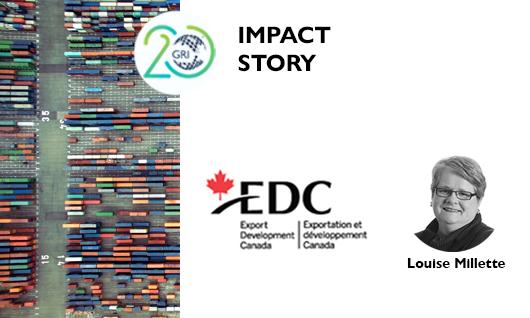Case Study: Creating Positive Business Impacts for Exporters and Investors Through CSR

Export Development Canada (EDC) is a credit agency, offering innovative financing, insurance, and risk management solutions to help Canadian exporters and investors expand their international business. We spoke to Louise Millette, Project Coordinator, Corporate Responsibility at EDC, about how important the triple bottom line is for financial institutions like EDC.
Louise Millette: Reporting on sustainability and corporate social responsibility (CSR) is a key tool for us to respond to stakeholder interests in what we do and how we conduct our business. Every time we put together this information, we realize that we have a unique and powerful story to tell, and a formal CSR report offers a good means to tell that story.
Reporting has also helped us set sustainability goals for ourselves. For example, in 2016, we began assessing the carbon footprint of EDC’s investment portfolio and will use the results to determine how we can best support the transition to a low-carbon economy.
As part of the work EDC does in helping Canadian companies look for business opportunities abroad you are actually a user of sustainability data. Does this information factor in to the work you do?
CSR is embedded in everything that we do. CSR is about applying a rigorous, values-based approach to our daily business practices and, through these efforts, positively impacting the business that we help facilitate for Canadian exporters and investors globally. We review transactions to ensure that international standards we subscribe to will be met, such as the IFC Performance Standards and the Equator Principles. Where possible, we work with customers and borrowers to help increase their knowledge and understanding of these standards and how they can enhance their own business practices.
EDC has a special focus on small and medium-sized companies (SMEs) in its financing. However, SMEs have not yet picked up sustainability reporting in big numbers. In your opinion, what are the benefits of CSR and reporting for SMEs?
Some SMEs might already be working on improving their sustainability performance, but not reporting it externally. This can also become a competitive advantage when seeking contracts with some large suppliers or financiers. If a company has reporting available that demonstrates how they are mitigating the environmental and social risks of their business, and benefiting the areas they work in, this can make them more attractive to do business with. Telling your story can help others, and connect you with other organizations like yours. SMEs could benefit from reporting their road to success or the challenges they face; we all learn from our challenges and successes. Internally, going through a materiality exercise will help define what is indeed material to a company, and its stakeholders.
Like many organizations, EDC has faced some challenges when it comes to the materiality process. Can you talk a bit about that and how you are working to refine your materiality process?
Our material topics reflect where we spent most of our time and effort: pushing ourselves to be more transparent and informing stakeholders of our positions on various topics; keeping pace with international standards for review of environmental and social, including human rights, impacts, undertaking reviews of transactions in our effort to combat corruption in international business. Our material topics are driven by stakeholder interests, developments in benchmarks with peer institutions, employee interests and shareholder concerns. We conduct a materiality process every two years, with a refresh between those two years, if needed.
Refining the materiality process requires time and people’s commitment to complete. Getting all stakeholders together can also be a challenge. We are trying something new this year – having stakeholders complete a survey in order to refresh our materiality matrix.
EDC has reported with GRI for a long time, and is an early adopter of the GRI Standards. What do you think are the main benefits of using the GRI framework?
EDC has been a GRI reporter since 2005, and we find that it is a good platform to answer our stakeholders’ concerns. The guidelines also provide structure and facilitate comparisons across companies. EDC’s GOLD Community participation was a great vehicle for the transition from GRI G4 to the GRI Standards. We are confident our membership will enable us to remain key players in our ability to report as much as we can.
For more updates from GRI, please subscribe to the monthly newsletter.

